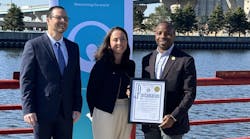While more than 20 tropical storms have deluged the Atlantic Coast this season, New Jersey is still in a drought watch. Despite the recent weather that brought flooding statewide, the region is in a period of below normal rainfall, which could lead to a drought by next summer. What concerns the Builders League of South Jersey is the failure on the part of the New Jersey Department of Environmental Protection to proactively plan for the state's long-term water supply.
The last drought, which ended after three years in 2002, should have been a wake-up call to state administration officials that planning was necessary to ensure that the state's growing population had an adequate supply of water.
"As residents we expect that when we turn the faucet on water will come out. What will we do the day nothing comes out?" asked Builders League of South Jersey president Patrick D. Bunn. "The state cannot honestly tell us whether there is enough water supply to meet our needs. New Jerseyans should ask what the NJDEP has done since 2002 to better manage our water resources, so as to more effectively deal with a potential future drought. Unfortunately, the answer is virtually nothing."
The Builders League of South Jersey has been an active participant in the ongoing dialogue concerning water resource management in New Jersey. Among other things, the Builders League has proposed the following:
1. Comprehensive state-wide planning to protect New Jersey's water supplies and to reduce the frequency and severity of drought emergencies, which can be done under existing statutory authority.
2. Interconnection between water systems in order to increase supply.
3. A comprehensive study to determine the sustainable yield of the region's water supply aquifers.
4. Creation of a South Jersey water district with authority to reallocate water supplies from surplus areas to deficit areas, equalize water rates, augment infrastructure and serve as a supplier of last resort.
5. Beneficial reuse of wastewater.
6. Use of reclaimed wastewater to recharge aquifers.
7. Mandatory year-round water conservation measures.
8. Alternative water supply strategies.
9. A rational and streamlined process for issuing and revising water allocation permits.
10. Create areas of critical water supply, as necessary, which can be done under existing statutory authority.
11. Desalination along the Atlantic coast.
12. Surface or subsurface reservoir storage.
13. Transport of water from alternative sources outside of the region.
"For the most part, the NJDEP has not responded to these suggestions. Nor has the NJDEP advanced any solutions of its own," said Bunn. "Where is the science? Rather than conducting the research necessary to determine the true availability of our water supplies the department has engaged in business as usual, denying most new water withdrawals or expansions from the aquifers without true proof that supplies are excessively limited."
Now, in light of a potential drought, the NJDEP can think of nothing better to do than to gear up the "no machine," so that all activity will come to a halt at the first drought warning. The citizens of New Jersey have a right to expect more from the State environmental agency.
Source: Builders League of South Jersey

